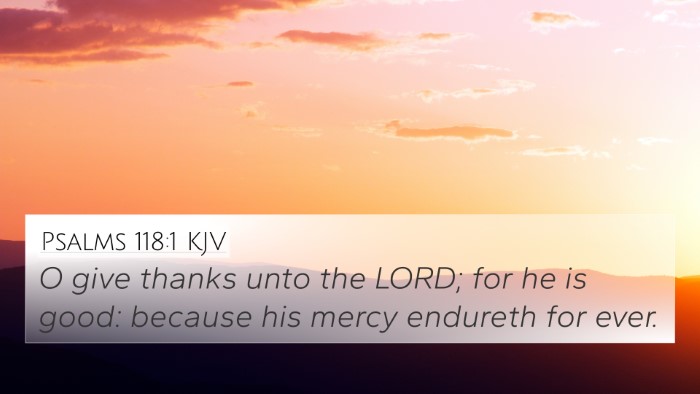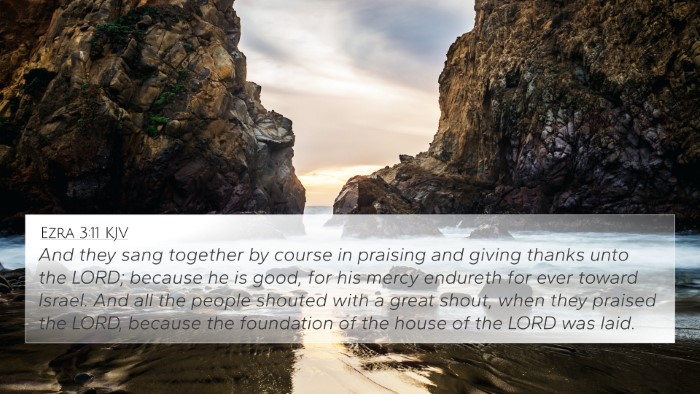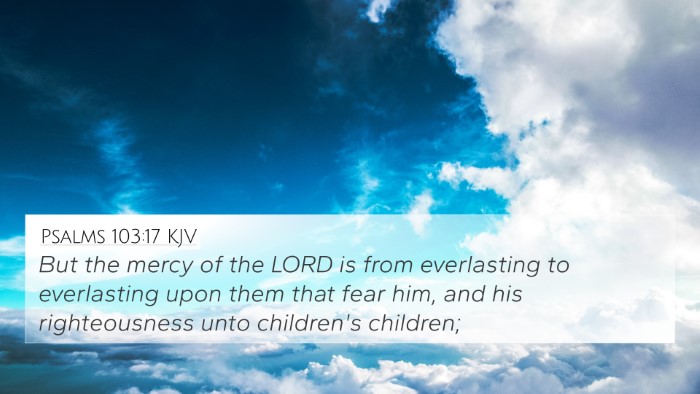Psalms 118:29 - Meaning and Interpretation
Bible Verse: Psalms 118:29
Verse Text: "O give thanks unto the LORD; for he is good: for his mercy endureth forever."
Summary of Biblical Meaning
This verse encapsulates a profound message of gratitude towards God, emphasizing His goodness and enduring mercy. The verse serves as a reminder of the importance of giving thanks to the Lord for His unwavering love and kindness. Scholars and commentators provide insights that enhance our understanding:
- Matthew Henry: He highlights that this call to thanksgiving serves as the concluding expression in this psalm, reflecting the joy and thankfulness that should resonate within believers' hearts. It shows a collective recognition of God's benevolence.
- Albert Barnes: Barnes points out that the psalmist is focusing on the character of God—His goodness and mercy—emphasizing that these attributes form the foundation for worship and gratitude among His followers.
- Adam Clarke: Clarke elaborates on the Hebrew meaning of “good” and “mercy,” denoting God’s inherent nature and continual kindness towards humanity, which draws believers into a deeper relationship with Him.
Cross-References and Thematic Connections
Psalms 118:29 connects to several other scriptures, showcasing the extensive biblical theme of gratitude and God's goodness. Here are 10 cross-references that reflect these themes:
- 1 Chronicles 16:34: "O give thanks unto the LORD; for he is good; for his mercy endureth forever." This passage reiterates the same message of thanksgiving to God.
- Psalm 136:1: "O give thanks unto the LORD; for he is good: for his mercy endureth forever." Similar to Psalm 118:29, emphasizing God's eternal mercy.
- Ephesians 5:20: "Giving thanks always for all things unto God and the Father in the name of our Lord Jesus Christ." This New Testament verse encourages continual thanksgiving.
- Romans 2:4: "Or despisest thou the riches of his goodness and forbearance and longsuffering; not knowing that the goodness of God leadeth thee to repentance?" This connects God's goodness with His merciful nature, leading to repentance.
- Psalm 100:4: "Enter into his gates with thanksgiving, and into his courts with praise: be thankful unto him, and bless his name." This verse emphasizes the importance of approaching God with gratitude.
- James 1:17: "Every good gift and every perfect gift is from above, and cometh down from the Father of lights." Highlights the source of all goodness as God.
- Psalm 30:5: "For his anger endureth but a moment; in his favor is life: weeping may endure for a night, but joy cometh in the morning." Affirms that while challenges exist, God's goodness brings joy.
- Hebrews 13:15: "By him therefore let us offer the sacrifice of praise to God continually, that is, the fruit of our lips giving thanks to his name." Encourages continuous worship and gratitude.
- Colossians 3:17: "And whatsoever ye do in word or deed, do all in the name of the Lord Jesus, giving thanks to God and the Father by him." This advocates that all actions should stem from a place of thanksgiving.
- Psalm 107:1: "O give thanks unto the LORD, for he is good: for his mercy endureth forever." Another reiteration of the themes found in Psalm 118:29, reinforcing the significance of recognizing God's goodness.
Understanding the Significance of the Verse
The verse reminds believers of the foundational truth that God is inherently good. Understanding His goodness and mercy leads to a deeper relationship and an attitude of gratitude. This concept resonates throughout scripture, urging believers not only to recognize God's attributes in isolation but also to appreciate how these attributes are manifested in their lives.
Thematic Connections in the Bible
The themes of thankfulness and divine mercy can be seen woven throughout the Bible, establishing a network of scriptural cross-referencing that enhances understanding and interpretation:
- Thankfulness as a Central Theme: Across the Old and New Testaments, there is a consistent call for believers to express gratitude, as noted in the references mentioned above.
- God’s Mercy: The enduring nature of God's mercy is portrayed throughout biblical narratives, highlighting His patience and desire for reconciliation with humanity.
- The Response of the Faithful: Believers are called to embody thankfulness, influencing their words and actions as illustrated in the mentioned New Testament verses.
Exploring Inter-Biblical Relations
In studying Psalms 118:29, one begins to see a rich tapestry of scripture where verses resonate and connect, encouraging comparative Bible verse analysis. This illustrates the inter-Biblical dialogue that exists:
- Old Testament Foundations: The Psalms frequently emphasize praise and thanksgiving, establishing a tradition that carries through the scriptures.
- New Testament Fulfillment: The teachings of Jesus and the Apostles consistently reference the themes found in the Psalms, linking Old Testament truths with New Testament realities.
How to Utilize Cross-Referencing Tools
For those interested in diving deeper into how Psalms 118:29 relates to other Scriptures, various tools and methods are effective:
- Bible Concordance: Use a concordance to find related verses based on keywords such as "thanksgiving" and "mercy."
- Bible Cross-Reference Guide: Reference guides provide thematic connections between verses and help identify those that correlate with specific concepts.
- Cross-Referencing Methods: Employ systematic methods of Bible study that prioritize thematic connections and word studies for deeper insights.
- Study Texts and Commentaries: Engaging with commentaries, such as those by Matthew Henry or Adam Clarke, can provide historical and contextual insights.
Conclusion
Psalms 118:29 serves as a profound reminder of God’s goodness and mercy, inviting believers to respond with gratitude. As one explores the connections and themes underpinning this verse through careful cross-referencing and study, a richer understanding of the biblical text emerges. This encourages individuals to reflect on their own lives and to express thankfulness for the divine attributes that shape their faith journey.






